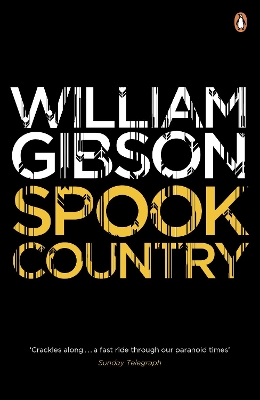Reviewed by pamela on
Perhaps this feeling I have comes a lot from the way I approach this book. By this I mean my cultural milieu. I approached it from the point of view of a ‘young Australian’. It felt like there were so many things in this book I could simply not relate to. My youth made the language seem strained, almost like Gibson was trying too hard to be ‘hip’, and the consumerist driven action was far too – for wont of a better word – ‘American’.
The Plot follows three groups of people; Hollis Henry and her employers Blue Ant, as well as the rock band she used to be part of; Tito, a young Cuban-Chinese man (or is it boy? His age is only passingly mentioned, and then as a ‘he looked like’ not a ‘was’) and his underground crime family; Brown and Milgrim, a claimed DEA Agent and his captive. These stories seem separate but naturally are working to the same conclusion which will lead them from their bases in America to the final showdown in Vancouver, Canada. This said however I think Gibson failed to give each group enough of a story or background. There are connections that are hinted at, but too cryptic for the reader to be certain. Perhaps this was intentional, but throughout the whole work I felt that I was missing some fundamental point to each of the characters.
The characters themselves I found empty. I got no sense of motivation, or even appearance, from any of them. Rather than give his characters any personal definition Gibson instead chose to define them by the products they used, consumed, or had the money to acquire. Once again this was most likely intentional, but it made the characters very hard to relate to. The protagonist, Hollis, is the only character with a defined past, but even that is superficial and shallow. Perhaps Gibson was attempting to draw attention to the culture they are currently in, rather than the characters themselves, but as a reader I personally find it difficult to relate to a novel, or even enjoy it enough to want to grasp its meaning if there is not even a single character with whom I can identify. I was irked by Gibson’s failure to let me know what the characters looked like, what their personalities were, or even where they were situated or what time it was. I could never tell if it was day or night. The ‘noir’ was simply so much that I just assumed all the action of the novel took place at night.
All motivation in this novel suffered from an undertone of ‘because I want to’, or ‘because I can’. While this is a criticism of today’s Western society it is a very shallow look at a very complicated world. There were parts of the narrative that excited me, like the GPS driven locative art created by the artists it is originally Hollis’ objective to investigate. For me this was completely original and I wanted more investigation into this side of the world from which the characters originated. Imagine my disappointment when this wonderful concept turned out to be completely incidental to the plot, which drives us toward an ultimately disappointing conclusion.
The plot is so full of incidental information. I felt often it was placed in just to give the characters some rudimentary sense of identity, rather than to say or advance anything really substantial. The only thing I could derive from these hastily constructed artistic backgrounds was that art needs to enter commerce to survive. Was this the amazing revelation that this book claimed it would give me about the society in which I live? I certainly hope not. I am not above admitting that there may be a deep and complex point that I simply may not have understood. I am however an intelligent, educated human being. I very rarely feel that a book is ‘over my head’ so to speak but perhaps this one is. If I delved deeper into it perhaps I might find the promised revelation of my reality staring me in the face, but to be frank the book was not constructed in a way that gave me any interest or inclination to re-read it, let alone pull it apart and find its hidden meanings.
Don’t get me wrong, this is not by any stretch of the imagination a ‘terrible’ book. I simply found it un-engaging and alienating. The constant product placement made me even more unable to relate. I don’t wear Adidas, I don’t us a PowerBook, and I simply don’t think that using an iPod for data storage instead of simply music is an original concept.
Frankly Spook Country is readable, but far from Gibson’s best work. The overall experience was underwhelming and disappointing.
Review also available at http://iblamewizards.com/review-william-gibson-spook-country/
Reading updates
- Started reading
- Finished reading
- 26 May, 2014: Reviewed
